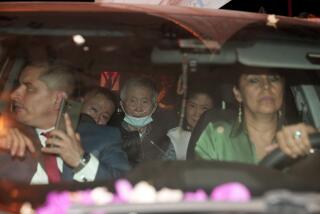Renuncia or Renuncia Irrevocable in Peru?
- Share via
The unexpected announcement by Peruvian President Alberto Fujimori that in the face of growing opposition, he will step down and convene new national elections in which he will not be a candidate, raises as many questions as it resolves.
The first question is whether Fujimori’s Saturday night surprise was intended as a renuncia--in effect, a threat to resign--or a renuncia irrevocable, a genuine and irreversible resignation. Those who have followed Fujimori’s career know well his penchant for feints and reversals of field skillfully designed to keep opponents off balance and maintain his power. The possibility that Fujimori actually intends to retain the presidency should not be dismissed.
Even if his resignation turns out to be both sincere and permanent, there is a question about who made the decision and why. Was this a personal judgment, or was it imposed upon him by a faction of the armed forces with decisive, if invisible, power? What will be the role of the military in the proposed transition and the next Peruvian government? How can effective civilian control of the armed forces be reestablished?
Another area of uncertainty concerns the transition process. Who will manage the proposed electoral process and assure its transparency? Will the government’s resources be used to assure the election of Vice President Francisco Tudela as they were used, by all accounts, to guarantee Fujimori’s reelection in May? Will international electoral observers have an unfettered and significant role, or will they be flouted once more? The most important concerns center on the ability of Peruvians to seize the opportunity presented by Fujimori’s move and to construct an effective and sustainable democratic governance.
Building real democracy takes more than elections, particularly in a society like Peru with strong authoritarian traditions and weak civic institutions. For 50 years, Peruvian politics have been dominated by rival leaders and groups crusading to “save Peru” by excluding and defeating enemies, not by building consensus. Despite their enormous and important differences, the American Popular Revolutionary Alliance party, Fernando Belaunde’s Popular Action party, the revolutionary government of the armed forces, Shining Path, novelist Mario Vargas Llosa and his movement, and Fujimori himself have all shared a sense of conviction that is directly contrary to what distinguished Judge Learned Hand once defined as the “spirit of liberty”: i.e. the sense that one cannot be so sure who is right when social values and political judgments are at stake.
Nothing that Alberto Fujimori has done or said during his 10-year reign has helped build the climate of give-and-take that is central to democracy. Nor have the institutions necessary for effective democratic governance been strengthened by the Fujimori era. Peru’s political parties are fragmented and cannibalistic, its judiciary intimidated, and its Congress erratic. The media and nongovernmental civic organizations have shown resilience and creativity at times, but they may not be strong enough to discharge what will be needed from them in the months and years ahead.
Those in the international community who want to help Peru build democratic institutions have limited but significant leverage.
We can reinforce Fujimori’s decision by applauding it, while focusing attention on what happens next. We can use our influence to strengthen civilian control of the military, to persuade Peruvian opposition movements to work together to assure transparent elections and viable governing coalitions, and we can reinforce the capacity and the resolve of Peru’s civic institutions.
If all this is done, Alberto Fujimori’s latest surprise may become his best.
More to Read
Sign up for Essential California
The most important California stories and recommendations in your inbox every morning.
You may occasionally receive promotional content from the Los Angeles Times.













